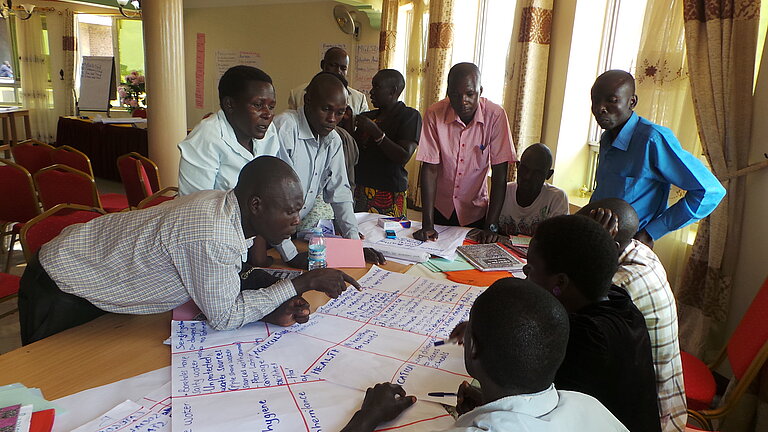During the 2020 International Literacy Day celebrations the Ugandan Commissioner of Community Development and Literacy informed all administrative heads of local governments that the new Integrated Community Learning for Wealth Creation (COLEW) programme, that was designed with the support of DVV International, is officially succeeding the previous Functional Adult Literacy (FAL) programme (watch online event here). It will now be rolled out to the whole country.
DVV International’s cooperation with the Ugandan Ministry of Gender, Labour and Social Development (MGLSD) started in 2015 when the MGLSD was exploring alternative literacy approaches to either revamp or replace the FAL programme. The new programme and methodology was supposed to meet learners’ needs, specifically around financial literacy and livelihoods opportunities combined with adult literacy. DVV International shared its experience and expertise and designed a new methodology, programme and implementation modality together with the MGLSD experts and management. DVV International’s experience with REFLECT as an integrated adult literacy approach that allows for community participation and combines adult literacy successfully with development and other social issues, was useful in the debate that led to the design of the new approach. Drawing substantially from the REFLECT approach and learning process, the new ICOLEW programme is in line with Uganda’s Vision 2040 and the Adult Literacy and Community Development policies, and embodies the following components and adult education services:
- Adult Literacy
- Community Development
- Business Skills Training
- Livelihoods Skills Training
- Village Savings and Loan Schemes (VSLA)
- Life skills
Piloting the new programme
The newly designed ICOLEW has been piloted since 2016 in 4 districts, with DVV International providing technical and financial support. The MGLSD and district government offices also contributed financial and human resources as well as land and buildings for ICOLEW groups and later for Community Learning Centres (CLCs) which were incorporated into the programme implementation modality. The MGLSD and their local government offices are the main implementers and they co-operate with other sector offices, such as agriculture, to deliver all the ICOLEW components.
As the pilot programme evolved from the preparation and capacity building stages to fully fledged ICOLEW groups with trained community facilitators and local government experts acting as trainers and supervisors, evidence started to emerge that the demand from the wider community and surrounding districts for the approach was beyond the pilot programme’s capacity to absorb. Not only did literacy levels increase, as was shown by the quarterly learner assessments that were conducted, but several community development action points were implemented jointly by ICOLEW groups, community members and local government sector offices. The Village Savings and Loan Schemes became a model for savings schemes and all departments within the MGLSD were recommended to follow the approach. As ICOLEW group members participated in the livelihoods and business skills training, they started agro-based income generating activities and some groups have evolved to the level of cooperatives.





